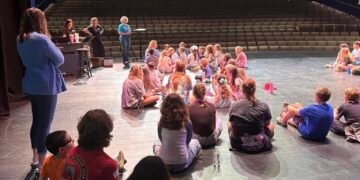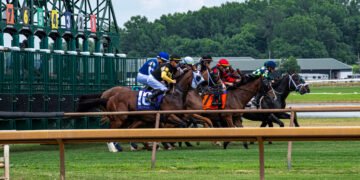(This article first appeared in the February print edition of the Hendersonian)
Dick Henderson, who died in the city poorhouse in 1884, was probably Henderson County’s most widely known Black man during the period around the Civil War.
An untold number of school kids read in the 1857 “Goodrich’s Fifth Reader” about his close call with wolves while on his way to officiate at a wedding.
“A highly flavored sketch of Dick’s escapade has amused the thousands of students of Goodrich’s school reader,” according to E.L. Starling’s 1887 history of the county, in which he noted Dick’s death in 1884. More in a moment about Dick nearly becoming dinner.
Starling also mentions wolves at two other points:
In November 1813, he noted, a man returning at night with a supply of fresh meat was attacked by wolves. He was “literally torn to pieces by the hungered wild animals. His body was discovered the next day … horribly mutilated and torn.”
He also wrote, “In early times, and even up to 1830, the settlers in this part of the county suffered greatly from the ravages of wild animals,” particularly wolves and bears.
Henderson County had wolves as late as the mid-1840s, according to documents that used to be filed among the criminal cases in the Henderson Circuit Court Clerk’s Office but have since been moved to the state archives in Frankfort.
On Feb. 25, 1843, Joel McClendon was paid $6 bounty for killing a wolf and James Manley of Warrick County, Indiana, was paid the same Sept. 11. James Wilkerson killed nine wolves and was paid $54 on April 25, 1845; I suspect Wilkerson exterminated the last local wolf pack.
There have also been a couple of wolf reports in more recent years. For instance, The Gleaner of Nov. 19, 1981, reported Hebbardsville area residents were afraid to let their kids play outside.
Ron and Judy Deaton discovered their German shepherd lying dead against their house. “My husband looked up the road and saw what looked like two wolves going up the hill,” Judy Deaton said. “Until we find out whether they’re wolves or not, I’m keeping my children inside.”
Pauline Haynes said she had seen a couple of wolves twice near her home the previous fall.
Former game warden Bob Bolds was positive they had not seen wolves. “I’d say it has to be coyotes,” said Bolds. “A bunch of them crossed over the river from Shawnee National Forest in Illinois in 1976 when the river was frozen over.”
Game Warden Billy Gene Cambron agreed, noting coyotes “have been coming on strong in this county the last few years. Twenty-seven of them were caught or killed last year.”
More recent still was an incident in April 2019 when a local woman was charged with stealing a wolf-dog hybrid on Martin-Martin Road. That animal was valued at $1,500.
Now that the wolves have chased me around the barn, so to speak, it’s time to teach y’all about Lesson 181 in “Goodrich’s Fifth Reader,” which is titled, “Uncle Dick and the Wolves.”
The lesson, referring to the man as Uncle Dick, is paternalistic, and there is a word or two now considered offensive. However, on the eve of the Civil War care was taken to avoid the word “slave.” Dick the fiddler was described as “a negro servant of one of the Hendersons” whose presence was essential at any wedding, dance or other social occasion.
The night in question he was to officiate at a wedding about six miles from town and provide music for the dancing that followed. The young people headed out while he prepared himself. “He donned his long-tailed blue coat, having carefully polished the glittering gilt buttons; then raised his immense shirt-collar, which he considered essential to his dignity, and, fiddle in hand, sallied forth alone.”
The path took him through a dense forest and heavy snow lay on the ground. He was in a hurry, “having spent a little too much time in polishing his gilt buttons,” and paid little attention to the howling of wolves. But soon, “to his indescribable horror,” he heard them in the bushes on either side of him.
The wolves were working themselves up to launch an attack.
“Every few moments a dark object would brush past poor old Dick’s legs with a snapping sound like that of a steel trap,” while the wolfpack’s howls and rustlings increased.
“Dick knew to run would be instant death, as the cowardly pack would all rush on him the moment he showed fear.” A forest clearing was coming up in which stood an abandoned cabin; he hoped to find refuge there.
But the wolves were getting bolder. “Instinctively he thrust out his fiddle at them,” accidentally brushing the strings, and the discordant sounds made them leap back, which gave him hope.
At the edge of the clearing, he made a run for it, “raking the strings more violently at every jump.” The astonished wolves initially paused at the edge of the clearing, but the sight of fleeing prey awakened their instincts. They gave chase.
He reached the door of the cabin just as the lead wolf was about to seize him and slammed shut the door. It was too rotten to keep the wolves at bay, but it provided him enough time to push through the broken roof and attain the top-most point.
But the wolves were practically licking his toes. “Now, in desperation, as he was kicking his feet in the air … he drew his bow shrieking across the strings. The yells instantly ceased.”
The wolves were not connoisseurs of bad fiddling, however, and soon renewed their attack. He thought he was lost when a “monstrous head” was thrust within a few inches of him. In desperation, he began playing Yankee Doodle and “instantly there was complete silence!”
He was safe as long as he played but the moment he ceased the wolves remembered they had missed dinner.
He played for several weary hours, despite the cold and his fatigue, until members of the wedding party came looking for him and chased the wolves away.
Dick’s story probably had been passed down as local folklore until Charles Wilkins Webber captured it on paper. But he never saw it in “Goodrich’s Fifth Reader” because he died the year before it was published.
Webber, a writer, adventurer and explorer who was born May 29, 1819, in Russellville, rode with the Texas Rangers, prospected for gold in what is now Arizona, and studied medicine and theology before turning to writing.
His 1844 short story called, “Jack Long: A Shot in the Eye,” graphically tells of the quest for revenge by a man who had been tortured and left for dead. It was highly praised by Edgar Allan Poe and many others; some say it’s the template for countless Westerns and action stories.
He also wrote nearly a dozen books, most of which dealt with natural history or his adventures in the West—where he met and made friends with John James Audubon during Audubon’s final trip to the Rocky Mountains—but some of his writings make clear he thought slavery was good and natural.
In that sense, Webber had a dark side that lumped him in with a human wolf pack. What else would you call American mercenaries who tried to invade Nicaragua to revive slavery there? Those filibusters, as they were called, planted seeds of distrust in Latin America that continue to this day.
“Many pro-slavery Southerners sought to expand southwards, allowing for more territory where slavery could continue to grow and expand,” according to a U.S. Department of State website about filibustering. “Some even imagined the United States as a great slave-owning republic that would stretch across the Caribbean to Brazil.”
The most widely known filibuster was a fellow named William Walker, who was invited to participate in Nicaragua’s civil war in 1855. He took advantage of it to set himself up as president in 1856—reinstituting slavery—until a coalition of Central American armies drove him from power in 1857.
Walker attempted to return to Nicaragua in 1860 but was captured by the British navy, which turned him over to the Honduran government. He was executed by firing squad.
Webber died in 1856 while fighting for Walker. A 16-year-old Henderson resident also was killed there that year and it’s probable other Henderson County men saw action fighting with Walker.
Starling, in his 1854 section, wrote, “A filibustering expedition against Nicaragua was quietly organized (by Walker?) in Kentucky this year, and Henderson furnished her quota of impetuous, misguided youths. Robert Burbank, a brilliant young man, enlisted and died while in that service.”
Burbank was the firstborn son of David R. Burbank, a wealthy tobacco stemmery owner with various other business interests. He founded the county’s first major distillery, sank its first coal shaft, and drilled a well near 12th Street and Merritt Drive in an unsuccessful effort to manufacture salt.
The New York Herald of Dec. 16, 1856, carried a letter from one of Walker’s army surgeons named Derickson, who expressed regret he was unable to fulfill the dying request of Robert Burbank.
“Inspired with a love of military glory, he ran away from home but died 10 days after his arrival in Nicaragua. Two days before his death he was in his first and only battle.” His dying breaths were too weak to give Derickson the address of his father.
“I desire very much that this account may reach his parents.”



























